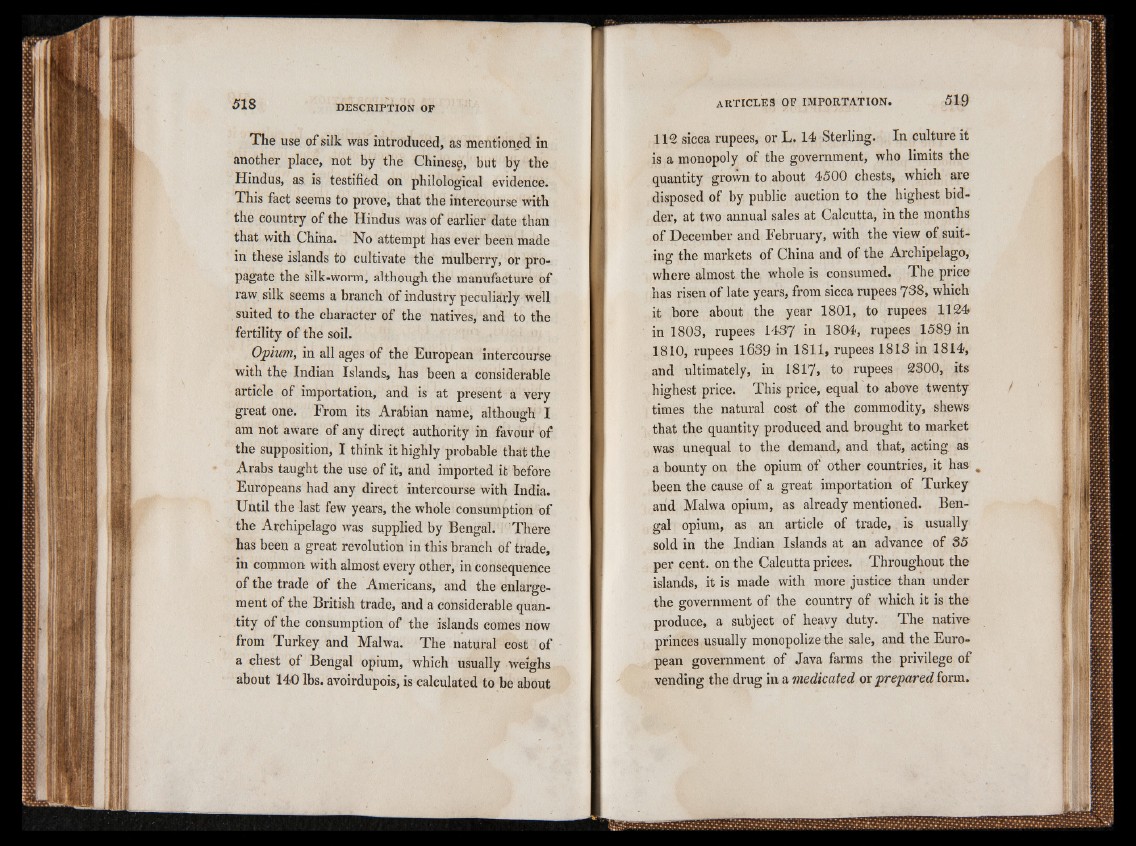
The use of silk was introduced, as mentioned in
another place, not by the Chinese, but by the
Hindus, as is testified on philological evidence.
This fact seems to prove, that the intercourse with
the country of the Hindus was of earlier date than
that with China. No attempt has ever been made
in these islands to cultivate the mulberry, or propagate
the silk-worm, although the manufacture of
raw silk seems a branch of industry peculiarly well
suited to the character of the natives, and to the
fertility of the soil.
Opium, in all ages of the European intercourse
with the Indian Islands, has been a considerable
article of importation, and is at present a very
great one. From its Arabian name, although I
am not aware of any direct authority in favour of
the supposition, I think it highly probable that the
Arabs taught the use of it, and imported it before
Europeans had any direct intercourse with India.
Until the last few years, the whole consumption of
the Archipelago was supplied by Bengal. There
has been a great revolution in this branch of trade,
in common with almost every other, in consequence
of the trade of the Americans, and the enlargement
of the British trade, and a considerable quantity
of the consumption of the islands comes now
from Turkey and Malwa. The natural cost of
a chest of Bengal opium, which usually weighs
about 140 lbs. avoirdupois, is calculated to be about
112 sicca rupees, or L. 14 Sterling. In culture it
is a monopoly of the government, who limits the
quantity grown to about 4500 chests, which are
disposed of by public auction to the highest bidder,
at two annual sales at Calcutta, in the months
of December and February, with the view of suiting
the markets of China and of the Archipelago,
where almost the whole is consumed. The price
has risen of late years, from sicca rupees 738, which
it bore about the year 1801, to rupees 1124
in 1803, rupees 1437 in 1804, rupees 1589 in
1810, rupees 16.39 in 1811, rupees 1813 in 1814,
and ultimately, in 1817, to rupees 2300, its
highest price. This price, equal to above twenty
times the natural cost of the commodity, shews
that the quantity produced and brought to market
was unequal to the demand, and that, acting as
a bounty on the opium of other countries, it has %
been the cause of a great importation of Turkey
and Malwa opium, as already mentioned. Bengal
opium, as an article of trade, is usually
sold in the Indian Islands at an advance of 35
per cent, on the Calcutta prices. Throughout the
islands, it is made with more justice than under
the government of the country of which it is the
produce, a subject of heavy duty. The native
princes usually monopolize the sale, and the European
government of Java farms the privilege of
vending the drug in a medicated ox prepared form.